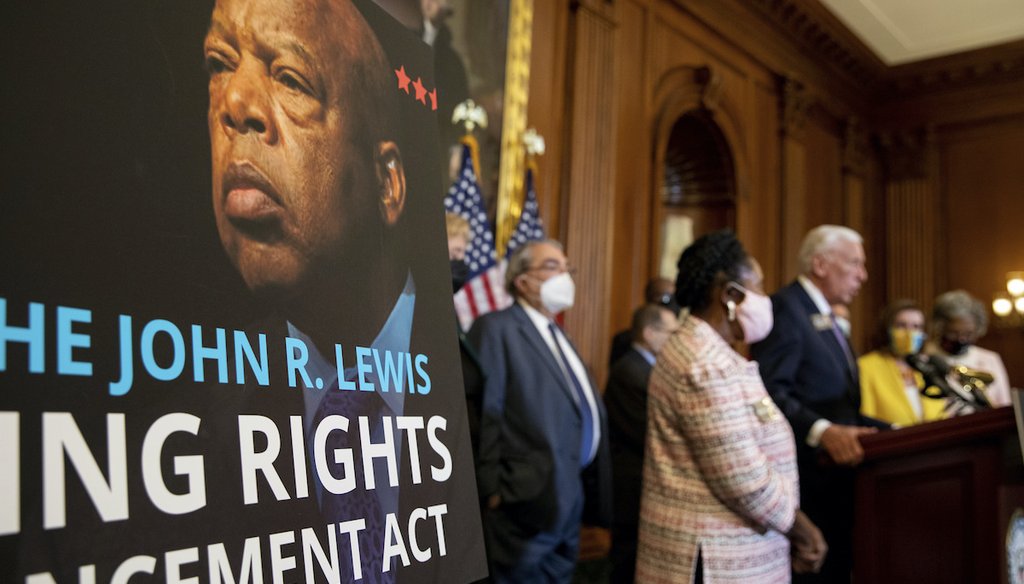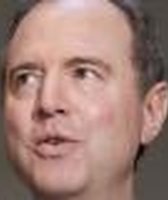Stand up for the facts!
Our only agenda is to publish the truth so you can be an informed participant in democracy.
We need your help.
I would like to contribute

A poster bearing the image of voting rights icon John Lewis is seen during a news conference after the House of Representatives passed the The John Lewis Voting Rights Advancement Act in Washington, on Capitol Hill in Washington, on Aug. 24, 2021. (AP)
If Your Time is short
-
The John Lewis Voting Rights Advancement Act, proposed by the Senate Democrats, aims to restore the power of the federal government to oversee state voting laws to prevent discrimination.
-
U.S. Supreme Court rulings in 2013 and 2021 made it harder for plaintiffs to challenge state voting laws under the federal Voting Rights Act.
-
Republicans reject the legislation as federal overreach.
Senate Democrats have proposed legislation that aims to restore the civil rights-era Voting Rights Act that has been weakened by recent U.S. Supreme Court rulings.
The John Lewis Voting Rights Advancement Act is named for the Georgia congressman, civil rights leader and voting-rights champion who died in 2020.
The legislation is more narrow in scope than the Democrats’ nearly 600-page Freedom to Vote Act. While the Freedom to Vote Act focuses largely on setting uniform federal rules for elections, including voting by mail and in person, the John Lewis Act focuses more specifically on preventing discrimination for minority voters.
Democrats view the bills as their last chance to change election laws before the 2022 midterms. Sen. Chuck Schumer, the Democratic leader, has said the Senate should consider both bills soon.
The partisan debate over the John Lewis Act is about whether politicians believe that recent changes in election laws and procedures can be racially discriminatory.
Sign up for PolitiFact texts
Supporters say the bill would renew the power of the federal government to oversee state voting laws and protect minority voters at a time when more GOP-led states have passed new restrictions. Sen. Patrick Leahy, D-Vt., who introduced the bill, said it would "ensure that the Voting Rights Act continues to have the effect long intended: to protect the right to vote."
But Republicans say the John Lewis bill is federal overreach and would make it too easy for plaintiffs to challenge state election laws that Republicans say are designed to prevent fraud. Sen. Mitch McConnell, the Republican leader, has called it "unnecessary" and said that "it's against the law to discriminate in voting on the basis of race already."
The House passed its version of the John Lewis Act in August in a party-line vote. In the Senate, Joe Manchin of West Virginia is the only Democrat to not sign on as a cosponsor, although he previously expressed support.
The 1965 Voting Rights Act barred voting restrictions based on race. Section 5 of the law required states or counties that had history of discrimination to preclear any proposed changes in their voting procedures with the federal government. To get approval, the jurisdictions had to prove that the change in voting laws would not harm minority voters. Attorney General Merrick Garland said that due to preclearance the Justice Department "blocked thousands of discriminatory voting changes."
But in 2013, the preclearance provision was essentially nullified by the U.S. Supreme Court ruling Shelby vs. Holder, an Alabama case. The court ruled that the coverage formula in Section 4 of the Act, which was used to determine which jurisdictions were covered under Section 5, was outdated.
That ruling meant that the preclearance requirement was moot until Congress came up with a new coverage formula, paving the way for states to implement or enforce new voting laws.
The John Lewis Act establishes a new coverage formula. It says that a state will be covered under the formula if, during the 25 previous years, there were 15 or more voting rights violations, or 10 or more voting rights violations if at least one was committed by the state itself. A state would no longer need preclearance if it has no voting rights violations for 10 years.
The Brennan Center for Justice at NYU estimates that under the new formula, fewer jurisdictions would initially face preclearance than before the Shelby decision. But while the law previously singled out jurisdictions for practices in the 1960s and 1970s, the new legislation would set a rolling time frame, so the number of jurisdictions that could meet the preclearance threshold could change over time.
The John Lewis bill "provides very strong tools to stop voting discrimation in its tracks or to provide voters stronger tools to challenge them if they happen," said Wendy Weiser, the center’s vice president for democracy.
But Ilya Shapiro, vice president of the libertarian Cato Institute and a critic of the legislation, predicts the bill would have a chilling effect.
"When jurisdictions think about changing their election laws, they’d have to think about the delay, budgeting for litigation, etc.," Shapiro said. "And also because no doubt some judges will incorrectly find discrimination where it doesn’t exist based purely on statistics."
The Senate legislation also adds a provision called "practice-based preclearance," which doesn’t single out geographic areas. Instead, it requires jurisdictions with growing minority populations to obtain preclearance for voting changes that include polling place closures and new voter list maintenance processes, among other things.
Another section of the Voting Rights Act, Section 2, bans governments from limiting voting rights based on race. But Section 2 was also weakened by the Supreme Court, this time in the July 2021 ruling Brnovich vs. DNC.
Evidence presented in court showed that minorities were more likely to have their ballots thrown out for voting out of precinct, and Native Americans on reservations were more likely to use ballot collection. But the court upheld Arizona’s ban on third-party ballot collection and invalidating ballots cast at the wrong precinct. The court concluded that the racial disparity caused by the out-of-precinct policy was "small in absolute terms," and the legislation on ballot collection had a basis of concern about potential for fraud. (Our other fact-checking has found no evidence of widespread fraud in Arizona.)
The court set new guideposts for future Section 2 claims that essentially said that the disparity in impact had to be significant, and that a state’s entire system of voting must be considered. That meant that if a state provided multiple ways to vote, a burden on one way to vote — for example, by mail -— would have to be evaluated while considering other available means to vote, such as in person.
The John Lewis bill would make it easier for plaintiffs to prove a violation of Section 2 by demonstrating a law’s disparate impact on minority voters, said Danielle Lang, director of voting rights at the Campaign Legal Center, an organization that supports the legislation.
"It specifically bars consideration of some of the factors that Justice (Samuel) Alito's opinion rested on, such as whether the total number of people affected is relatively small, prior use of a voting practice, invocation of fraud without proof, and the availability of other ways to vote," Lang said.
Critics of the legislation argue it would lead to challenging laws designed to prevent fraud, such as requiring a voter ID. We have found that the debate over voter ID is often framed as those who support voter ID laws and those who oppose them, and a stark choice between fraud and racism. In reality, there’s actually more nuance and variations on ID laws.
Finally, the legislation includes some other provisions to help Native American voters and also protect vote processes and election workers.
-
It incorporates the Election Worker and Polling Place Protection Act, which includes penalties for people who threaten, harass or violently attack election workers or facilities. These provisions are in response to death threats faced by election workers.
-
It allows any person to collect or drop off ballots for another voter residing on Indian tribal lands, banning states from placing a cap on collection. Some Native Americans on tribal lands have relied on organizers to shuttle their ballots because they live far from polling places and lack mailboxes at their homes. The legislation also ensures each tribe is entitled to a minimum of one voter registration site on Indian lands.
-
It sets notice and disclosure requirements for states if they make changes to voting rules or procedures within 180 days of a federal election.
RELATED: What’s in the Senate Democrats’ new voting rights bill?
RELATED: As extremes shape voter ID debate, the rules keep getting stricter
RELATED: All of our fact-checks about elections
Our Sources
Sen. Patrick Leahy, Leahy Leads 48 Senators In Introducing John Lewis Voting Rights Advancement Act, Oct. 5, 2021
Sen. Jon Ossoff, Sen. Ossoff Introduces Voting Rights Legislation to Protect Election Workers, Polling Places from Rising Threats, Oct. 5, 2021
Arizona Republic, High court upholds voting restrictions for Arizona, July 2, 2021
Rick Hasen in the New York Times, The Supreme Court Puts Democracy at Risk, July 1, 2021
Brennan Center for Justice at NYU, Large Racial Turnout Gap Persisted in 2020 Election Aug. 6, 2021
Wendy Weiser, vice president for democracy at the Brennan Center for Justice at NYU Testimony before Senate Judiciary Committee, Oct. 6, 2021
Roll Call op ed by Matthew Weil and Christopher Thomas at the Bipartisan Policy Center, How the Senate should fix the House voting rights bill, Aug. 27, 2021
Sen. Chuck Schumer, Dear colleague letter, Oct. 4, 2021
Vox, Joe Manchin’s sweeping new voting rights proposal, explained, June 17, 2021
Jason Snead, executive director of the Honest Elections Project, Twitter thread, Aug. 23, 2021
CQ, Senate Judiciary Subcommittee on the Constitution Holds Hearing on Voting Rights, Sept. 22, 2021
AP, Sen. Mitch McConnell comments, June 8, 2021
U.S. Department of Justice, Jurisdictions previously covered by Section 5, Sept. 11, 2020
Business Insider, 5 lawsuits now challenge Texas' new GOP election law — here's how the Supreme Court made the plaintiffs' tasks much harder, Sept. 7, 2021
Washington Post op ed by Attorney General Merrick Garland, Opinion: Merrick Garland: It is time for Congress to act again to protect the right to vote, Aug. 5, 2021
New York Times, How G.O.P.-Backed Laws in Montana Could Hurt Native American Voting, July 6, 2021
Campaign Legal Center, Senate Must Follow House in Approving John Lewis Voting Rights Advancement Act, Aug. 24, 2021
Reuters, Trump-inspired death threats are terrorizing election workers, June 11, 2021
PolitiFact, Trump falsely implies Arizona audit has exposed fraud, June 9, 2021
Email interview, Danielle Lang, director of voting rights at the Campaign Legal Center, Oct. 7, 2021
Email interview, Jason Snead, executive director of the Honest Elections Project, Oct. 8, 2021
Telephone interview, Wendy Weiser, vice president of democracy at Brennan Center for Justice at NYU School of Law, Oct. 7, 2021
Email interview, Ilya Shapiro, vice president of the Cato Institute, Oct. 7, 2021














































